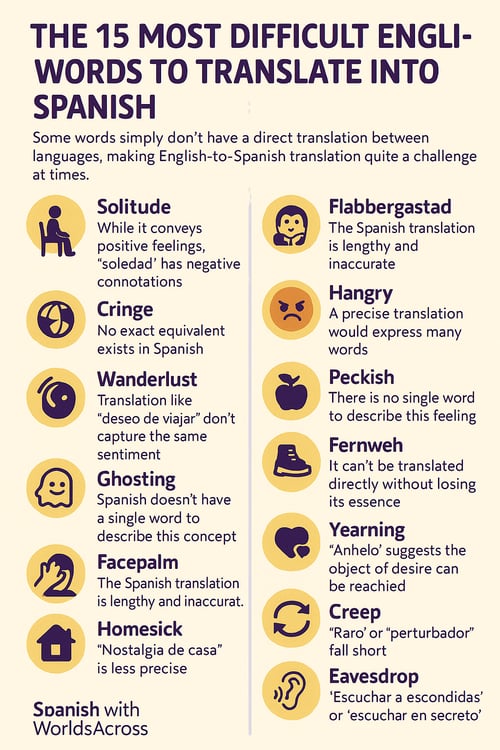The Fifteen Hardest English Words To Translate Into Spanish

Have you ever felt frustrated trying to translate English words into Spanish and failing to find an equivalent translation? Don’t worry! You’re not alone. Some words simply don’t have a direct translation between languages, making English-to-Spanish translation quite a challenge at times. Keep reading! Below, we’ll explore fifteen English words so difficult to translate into Spanish that they’ve earned the title of “untranslatable words.”
Let’s get started!

-
Solitude
Definition: This word refers to the state of being alone but enjoying the peace and tranquility it brings.
Why it’s difficult to translate: While "soledad" is the closest translation, "solitude" is associated with positive feelings, whereas "soledad" carries negative connotations, making an exact translation impossible.
-
Cringe
Definition: "Cringe" means to feel secondhand embarrassment for someone else.
Why it’s difficult to translate: Many believe the correct translation is “encogerse,” but these two words can have completely different meanings. Since there’s no equivalent term in Spanish, many Spanish speakers use "cringe" as is. It’s undoubtedly a classic untranslatable word!
-
Wanderlust
Definition: This word describes a strong desire or urge to travel and explore the world.
Why it’s difficult to translate: Its Spanish translation would be something like “deseo de viajar.” However, besides requiring more words, this translation doesn’t quite capture the same sentiment that "wanderlust" conveys in English.
-
Ghosting
Definition: "Ghosting" is the act of ending a relationship by abruptly cutting off contact with the other person without any explanation.
Why it’s difficult to translate: Currently, Spanish doesn’t have a single word that describes the act of "disappearing" without reason. That’s why Spanish speakers tend to use it in its original language.
-
Facepalm
Definition: "Facepalm" is the act of covering your face with one or both hands when experiencing embarrassment or frustration.
Why it’s difficult to translate: While English uses a single word to describe this action, the closest Spanish translation would require many more: “llevarse las manos a la cara.” Notice the inaccuracy? "Facepalm" is definitely one of those untranslatable words!
-
Flabbergasted
Definition: "Flabbergasted" describes a strong and intense state of astonishment.
Why it’s difficult to translate: The Spanish translation of "flabbergasted" could be “asombrado” or “sorprendido.” While these come close, they don’t fully convey the intensity of the emotion, so it wouldn’t be a very precise translation.
-
Hangry
Definition: Have you ever been so hungry that you start feeling irritable? Well, that’s what "hangry" means: a state of irritability caused by a prolonged lack of food.
Why it’s difficult to translate: While “irritabilidad” might seem like a good translation, the term is too broad and not exclusively associated with hunger. A more accurate translation would require many words, like: "Estoy de mal humor porque tengo hambre." See the inaccuracy?
-
Peckish
Definition: Being slightly hungry.
Why it’s difficult to translate: Like "hangry," there’s no single word in Spanish that describes the feeling of being slightly hungry. Its translation would be a bit lengthy: "Tengo un poco de hambre" or "Me provocó comer algo."
-
Fernweh
Definition: "Fernweh" refers to those longings or desires to travel to distant and unknown places. It’s also considered a kind of melancholy about staying at home instead of exploring new places.
Why it’s difficult to translate: Once again, there’s no single word in Spanish that directly captures the emotional meaning of "fernweh." Its Spanish translation would be lengthy and lose part of its essence.
-
Yearning
Definition: This word refers to an intense longing for something, especially something unattainable.
Why it’s difficult to translate: A close translation would be “anhelo.” However, while "yearning" is a longing for something unattainable, “anhelo” still considers the possibility of achieving what is desired, making it a less precise translation.

-
Homesick
Definition: "Homesick" is the sadness experienced when spending a long time away from home.
Why it’s difficult to translate: A close translation would be something like: “nostalgia de casa.” However, it requires more words and isn’t as precise as "homesick."
-
Creep
Definition: "Creep" describes a person with creepy behavior.
Why it’s difficult to translate: Words like “raro” or “perturbador” could be close translations. However, "creep" involves feelings of fear and unease that these two words don’t convey.
-
Backlash
Definition: "Backlash" refers to a violent negative reaction against something that has happened.
Why it’s difficult to translate: To translate "backlash" into Spanish, we would need a phrase like: "reacción negativa violenta." Therefore, it wouldn’t be a very exact translation.
-
Glitch
Definition: "Glitch" is a term used in computing to refer to technical failures.
Why it’s difficult to translate: In Spanish, we couldn’t translate "glitch" precisely with a single word. We’d need a longer phrase like: "pequeño problema técnico."
-
Eavesdrop
Definition: "Eavesdrop" means to secretly listen to other people’s conversations without them noticing.
Why it’s difficult to translate: Again, this is one of those words that have no equivalent translation. The closest phrases would be: "escuchar a escondidas" or "escuchar en secreto."
The fact that some words lack an equivalent translation can make English-to-Spanish translation quite challenging. However, this shouldn’t be seen as an obstacle; rather, it’s an opportunity to appreciate the complexity and cultural nuances that have shaped the essence of these languages throughout history.
Let’s celebrate the beauty and subtle differences between English and Spanish words, learn from them, and use them to keep growing on this long but rewarding journey of language learning.
¡Hasta la próxima!


